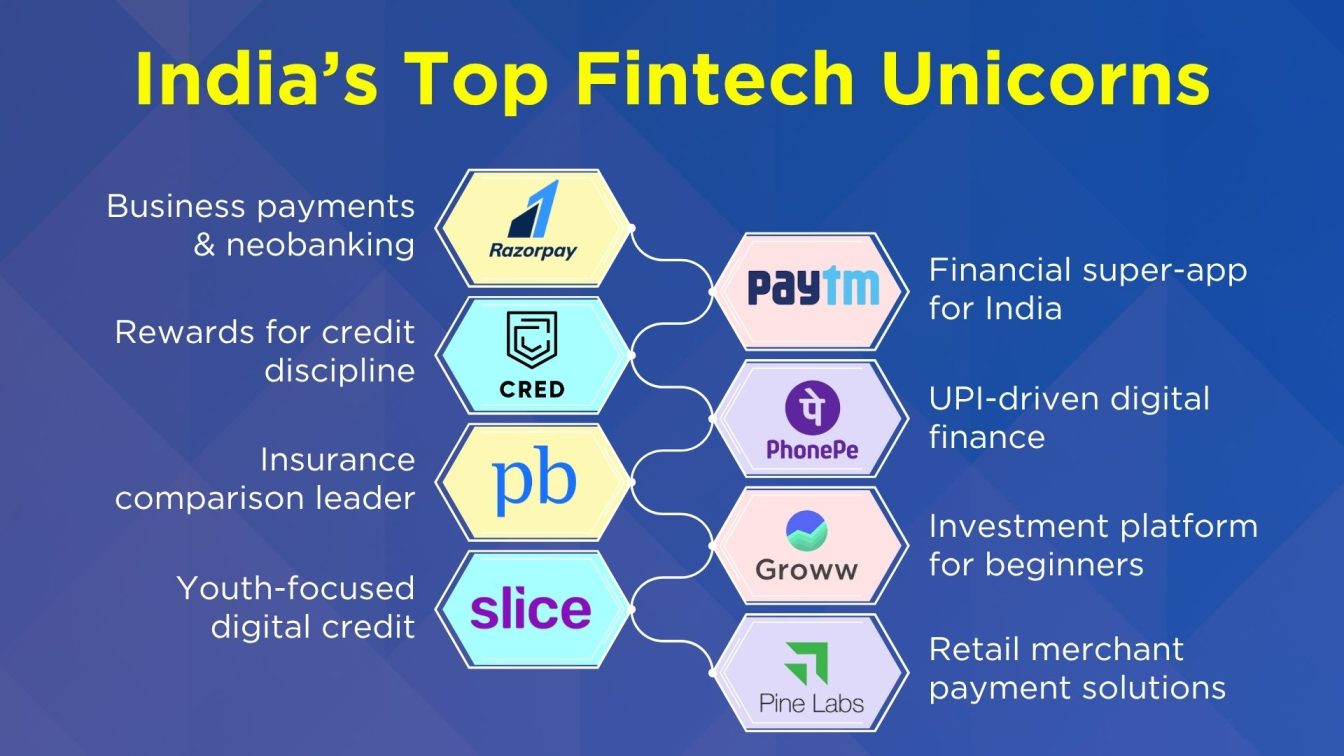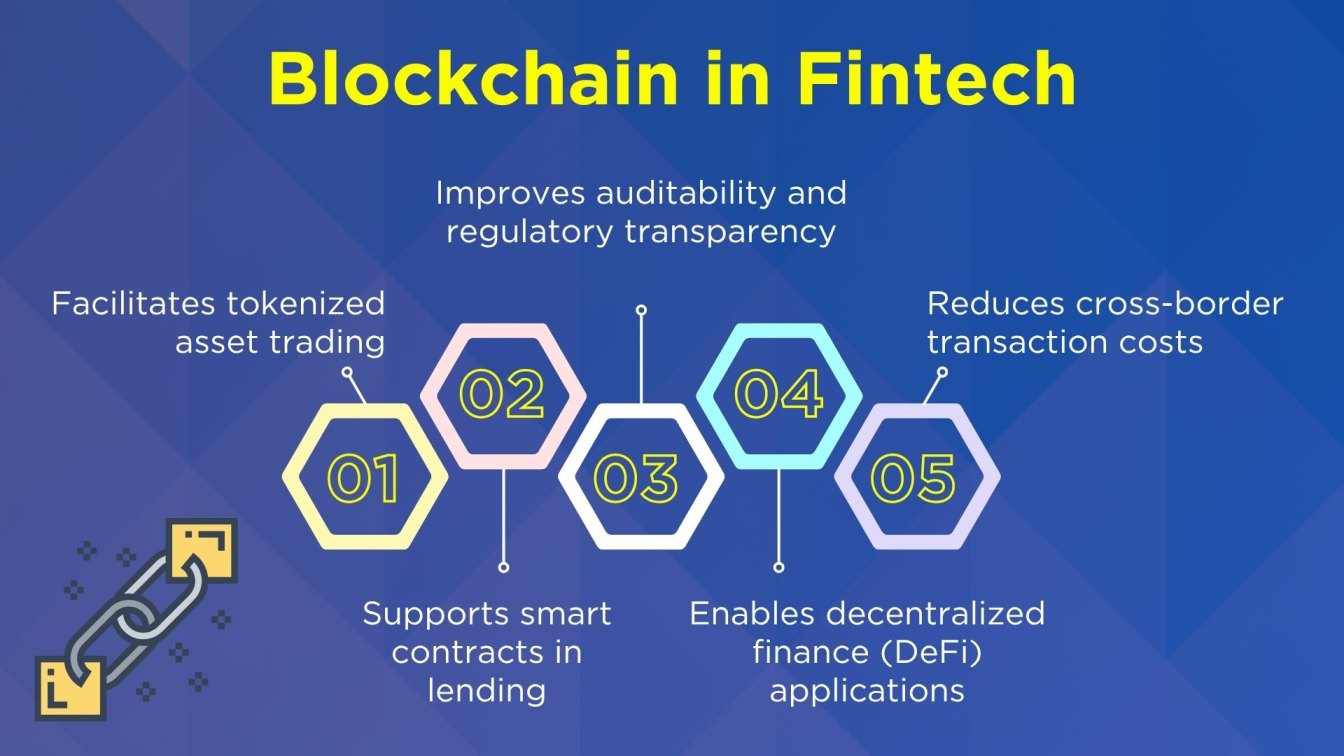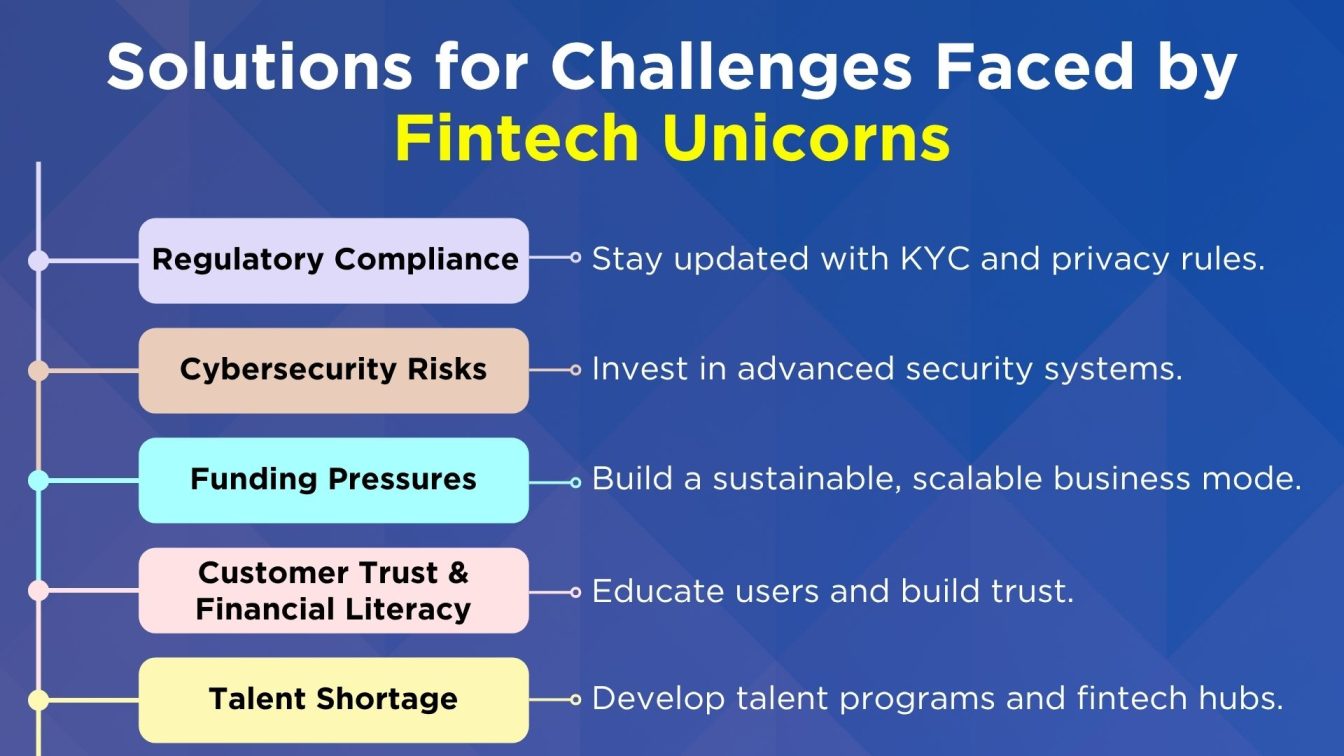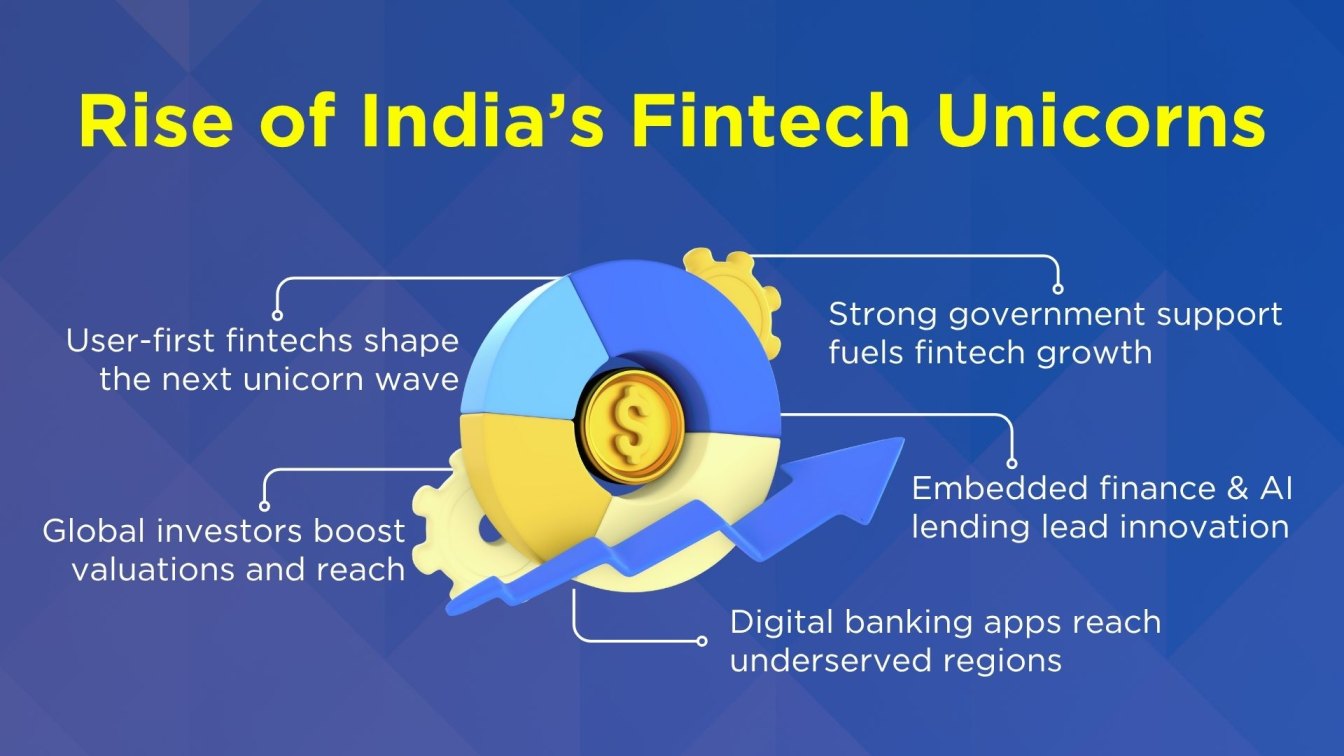The fintech landscape in India in 2025 celebrated a major accomplishment of having over two dozen fintech startups reach a unicorn status in 2025. These fintech companies are transforming the way Indians spend and send money by giving customers and businesses easy, efficient, and technologically-forward solutions. With tremendous regulatory backing, large-scale user adoption of digital and connected payments and an invigorating environment for entrepreneurs, India is one of the most accelerated fintech markets in the world. This document outlines the leading fintech unicorns and provides a discussion of the technologies and trends supporting this growth, as well as future considerations in this vital market.
Overview of Fintech companies in India in 2025
The fintech transformation in India is invigorating the digital-first economy, helping Indians access customer-first products (AI lending), wallets, digital lending, and neobanks. The founders operating out of Bangalore, Mumbai, and other innovation centers are accessing mentoring, hands-on technology experience to orchestrate the types of businesses and the funding being injected into the system through angel, pre-seed, seed, and Series C funded rounds by investors such as Accel India, Matrix Partners India, Peak XV Partners, Lightspeed Venture Partners, Blume Ventures, Venture Highway, Kalaari Capital, Kalaari, India Quotient, Jungle Ventures, Inventus, Omidyar Network India, Bessemer, SAIF Partners, and Chiratae. India’s fintech growth is fueled by smartphone adoption, improved digital banking solutions, and regulatory support from the RBI and NPCI.
The types of startups include enterprise SaaS, software, marketplaces transforming healthcare, travel, retail, education and making it easy for Indians to Sign up and Log in. And continuing journeys of investing into technology and entrepreneurs, creating strong portfolios of enterprise subsidy-backed leaders across fintech are reimagining the fintech revolution in India.
What you'll discover:
🚀 Fintech Growth in India – India internet economy landscape 2025
🚀 Leading Unicorns – Razorpay, Paytm, CRED, PhonePe, etc.
🚀 Key Technologies/Libraries/DB – AI / BlockChain, neobanks, infra-funded loans, digital wallets
🚀 Challenges/Learning Tech – Regulatory Technology, scalability, Consumer Trust
🚀 Sustainability – Embedded Finance, Open Banking, Globalization

Top Fintech Unicorns Driving India’s Fintech Revolution
A variety of unicorn fintech companies in India are driving advancement in finance with better fintech software development services and digital banking applications. These top fintech companies are great examples of leading and innovating payments, lending, and investing sectors, like PhonePe payment gateway and Razorpay payment gateway, which offers multiple finance solutions. In addition, created by the success of UPI applications in India, the digital payment landscape is ever-expanding, allowing easier access to financial services.
Razorpay
Razorpay is a fintech company founded in 2014 that provides payment gateways to different businesses, and is also known for its neobanking services around payments.
Methodologies Applied: Razorpay workflows are built on API-based payment flows, automated reconciliation, webhooks, and transaction monitoring in real time.
What Makes It Different: RazorpayX allows users to perform payroll processing, tax remittance, vendor payments, and current accounts, all from one single dashboard.
Key Technologies:
- API Integration: It connects a business to payment acceptance and banking solutions without friction.
- Cloud Infrastructure: It provides scalability and high-availability around data.
- Data Analytics: Provides insight into spending and transactions of a business.
Paytm
Paytm has transitioned from a mobile wallet provider to a complete financial super-app, complete with UPI services, lending, bill sharing, and investment opportunities. Built on springboot by combining a scalable backend with personalized user journeys using AI and ML, the differentiator for Paytm is that it offers consumers both rural and urban, end-to-end digital finance solutions.
The technologies used in the platform include:
- UPI Integration – Enables peer-to-peer and merchant payments.
- AI Personalization – Recommends services based on user behavior.
- Secure Payments Infrastructure – Allows safe digital payments.
CRED
CRED is a platform that gives rewards to its users for paying their credit card on time along with providing curated financial products.
Methodologies Used: Utilizes gamified experiences, design-first UI, and behavioral analytics.
Differentiation: CRED combines financial services with luxury experiences to create a lifestyle-centric platform.
Key Technologies:
- Gamification – Provides incentives and rewards to incentivize on-time payment.
- Mobile-First UX – Focuses on design and accessibility.
- Credit Analytics – Provides personalized lending offers and credit scores.
PhonePe
A major UPI-based app that offers payments, insurance, investments, and merchant services.
Methodologies Used: App-first strategy, merchant dashboards, and micro-insurance integration.
What Sets It Apart: PhonePe for Business empowers small businesses with real-time insights.
Key Technologies:
- UPI Stack: Powers fast and secure payments.
- Data Analytics: Helps merchants track performance.
- Cloud Infrastructure: Supports high transaction volumes.
PolicyBazaar
PolicyBazaar is India’s largest insurance comparison portal, simplifying policy selection.
Methodologies Used: Personalized recommendations using ML and vast insurer network APIs.
What Sets It Apart: Enables transparent, side-by-side policy comparison across health, life, and vehicle insurance.
Key Technologies:
- Machine Learning: Recommends optimal policies.
- API Aggregation: Collects insurer data in real time.
- Secure KYC Verification: Enables seamless onboarding.
Groww
Groww is an investment app that allows users to invest in mutual funds, stocks, ETFs, and more.
Design Principles: education-first investing, paperless KYC, low entry barriers.
What Makes It Unique: Makes investing simpler for first-time users with easy-to-use charts and guides.
Key Technologies:
- KYC Automation – Speeds up onboarding.
- Zero-Commission Engine – Lowers friction for users.
- Mobile UX Optimization – Makes investment exploration feel intuitive
Slice
Slice offers modern credit options, such as the Slice card, digital credit lines, and rewards.
Methods Used: Instant credit approvals, smart billing cycles, and cashback.
Differentiating Factors: Created for the youth of India, especially students and salaried millennials.
Key Technologies:
- AI-Powered Credit Scoring – Determines creditworthiness in real time.
- Instant KYC Verification – Quickly onboard users.
- Spending Analytics – Tracks user spending and rewards.
Pine Labs
Pine Labs delivers point-of-sale and merchant payment solutions across Asia.
Methodologies Used: Offers smart terminals, financing options at checkout, and EMI conversion.
What Sets It Apart: Seamlessly connects offline retail with digital payment systems.
Key Technologies:
- POS Software Stack: Combines hardware and software.
- EMI Integration Engine: Converts payments into installments.
- Data Insights: Provides merchants with business intelligence.

Other Notable Fintech Startups India
- Dunzo: Delivery + digital payments integration
- Livspace: Home services with digital wallets
- Unacademy: Edtech + digital-first economy financial tools
- Byju’s: Edtech SaaS solutions with venture funding
- Zomato & Swiggy, Freshworks, Swiggy: Food marketplaces with digital wallets
- Ola & Traveloka: Mobility & travel digital wallets
- Snapdeal, Dream11, Myntra, Cashify, NestAway, Kredivo, Tala, Ezetap, Carsome, Simpl, Whatfix, Propelld: Diverse fintech & marketplace solutions
- Sharechat: Social media + fintech integrations
- Money View & Niyo: Neobanks & AI-driven lending platforms
- Upstox, Flipkart, Udaan: Internet-driven customer-centric products
- Facebook: Leveraging fintech tech for enterprise SaaS
These startups showcase product-market fit, tech expertise, and hands-on experience in fintech Seed, pre-seed, and Series C stages.
Technologies Driving Growth in Indian Fintech Unicorns
Innovative fintech unicorns in India are utilizing new technologies to better services for users and profit, as well as scale in different industries.
- AI lending platforms: Offer personalized credit and leverage real time assessment.
- Blockchain: Offers secure and transparent digital wallet transactions.
- Cloud Computing: Offers a scalable SaaS solutions and enterprise platforms.
- Data Analytics: Offer insights to understanding user behavior and business performance.
- Mobile Technology: Offers seamless Sign up and Log in experiences for consumers.

Challenges Faced by Fintech Companies in India
The rapid growth in India's fintech sector accompanies numerous hurdles for startups, which can prove difficult as the startup attempts to achieve growth and success.
- Regulatory Confusion: Complying and navigating varying regulations and compliance across India.
- Intense Competition: Competing with other fintech startups and established marketplaces.
- Funding Stability: Identifying sources of funding at the pre-seed, seed, Series C, etc. stages.
- Consumer Trust: Building trust in digital wallets, neobanks, etc., and digital financial services.
- Technology Adoption: Getting users to adopt fintech solutions in a digital-first economy.

The Future of Fintech Unicorns
The commitment of founders, strategic partner ventures, and angel investors means the money continues to flow, there will be more global dominance (in the best way possible!), and enterprise SaaS will continue to flourish. The Indian population will have access to better financial services, which will be enabled by AI-enabled lending platforms, digital wallets, neobanks, and marketplaces. The fintech revolution will continue, supported by the collaborative ecosystems made up of mentorship, hand holding in tech, and overall portfolio support.
By 2025 and beyond, companies and startups like Paytm, Razorpay, CRED, PhonePe, Groww, Slice, Lendingkart, Perfios, Pine Labs, Unacademy, Byju, Dunzo, Ola, Swiggy, Zomato, Sharechat, Traveloka, Myntra, Upstox, Flipkart, Udaan, Snapdeal, Dream11, Freshworks, Facebook, Cashify, NestAway, Kredivo, Tala, Ezetap, Carsome, Simpl, Whatfix, Propelld, will continue to redefine India's digital-first economy by making financial services more accessible, better, and consumer-friendly.

Conclusion
The fintech unicorns in India in 2025 demonstrate their capacity to shape the financial services landscape through innovative thinking, sound technology, and a customer-obsession mentality. The “fintech revolution” phrase is quite descriptive of their influence not only as a startup from Razorpay and Paytm but also from CRED, PhonePe, and Grow as they redefine payments, credit, and investment journeys - all at the same time. The news of these companies includes leading investors such as Accel Partners, Prime Venture Partners, Nexus Venture Partners, Stellaris, Elevation, and AngelList India, all through pre-seed and seed funding rounds. These companies are already a testament to how far the vision of entrepreneurial innovators and operational expertise can impact the market. This progress of innovations is no longer limited to the basic API’s built on Postman or working on a credit card company, but they continue to demonstrate strong product-market fit while servicing the Indian market with new and innovative digital wallets, neobanks, AI lending, and marketplaces. A long list of fintech startups is emerging that illustrates the capacity of well financed -entrepreneurs to innovate and scale fintech services in India and promote the digital-first economy.
People Also Ask
How do fintech unicorns boost financial inclusion in India?
Fintech unicorns offer digital payment platforms, microloans, and affordable financial services, helping reach underbanked and rural populations.
What role do government initiatives play in supporting fintech unicorns?
Government programs such as Digital India, Startup India, and UPI infrastructure support fintech growth by providing digital access, regulatory support, and incentives for innovation.
Are fintech unicorns expanding internationally from India?
Yes, many fintech unicorns are entering emerging markets in Asia, Africa, and the Middle East, leveraging India’s tech-driven financial models.
How are fintech unicorns ensuring cybersecurity and data protection?
They implement encryption, two-factor authentication, and adhere to RBI and GDPR-compliant frameworks to safeguard user data and establish trust.
What are the main revenue models for fintech unicorns in India?
Key models include transaction fees, subscription services, lending interest, and commission-based earnings from financial product distribution.





%201.webp)

